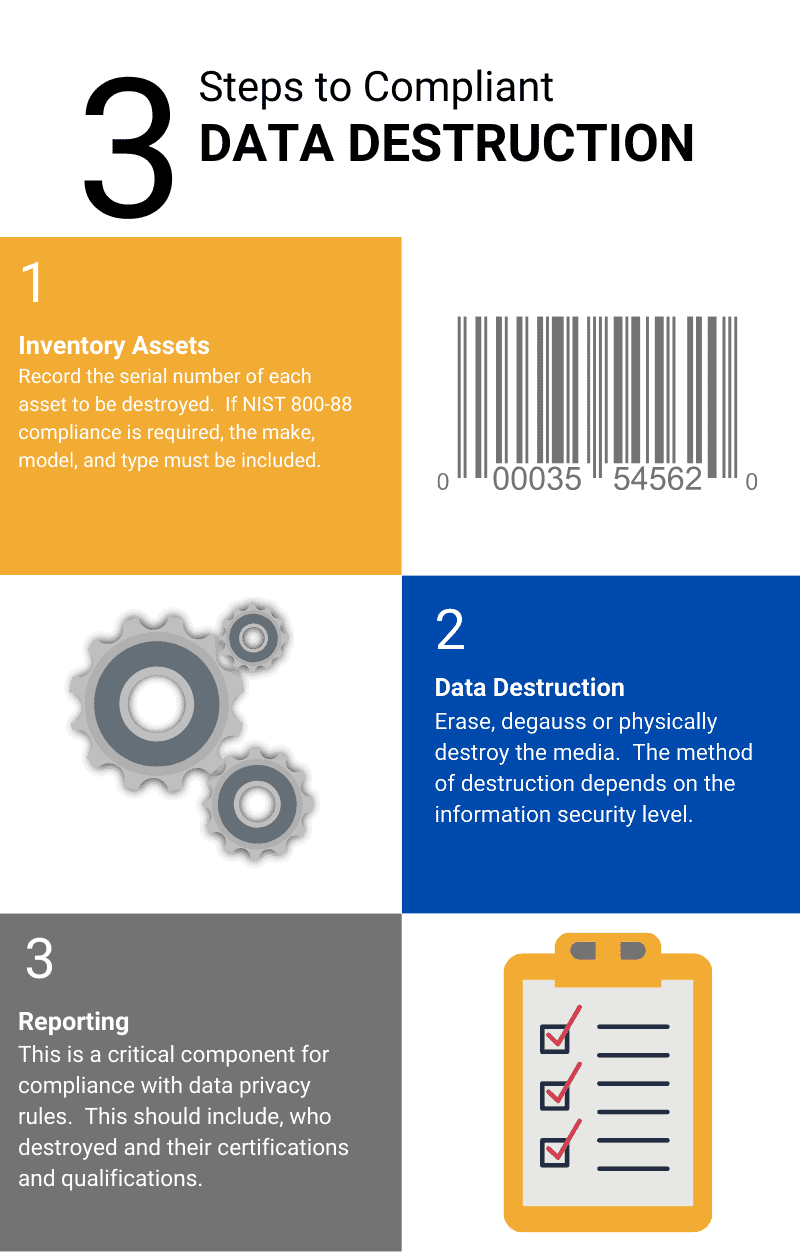Enhancing Cyber Security through Advanced Data Destruction Approaches
Enhancing Cyber Security through Advanced Data Destruction Approaches
Blog Article
The Necessary Nature of Data Damage in Upholding Computer Safety Services and Protecting Versus Unauthorized Accessibility
In an era where information violations and identification burglary are progressively common, the relevance of effective information devastation can not be overemphasized. Organizations should acknowledge that the failure to correctly throw away sensitive details postures not only legal and monetary threats yet also a possible erosion of customer trust fund. Various techniques, from data wiping to physical damage, serve as crucial safeguards against unauthorized gain access to. However, understanding the implications of data devastation methods and conformity with laws increases crucial concerns regarding the competence of current methods and their long-lasting stability when faced with evolving risks.
Value of Information Destruction
In a significantly electronic globe, the relevance of information damage can not be overemphasized. As companies accumulate huge amounts of delicate information, the possible repercussions of failing to properly take care of and get rid of of that information become progressively serious. Information violations, identification theft, and business reconnaissance present substantial hazards, emphasizing the necessity of effective information devastation methods.

In addition, as modern technology progresses, so too do the approaches through which malicious stars look for to manipulate sensitive info. Organizations should remain positive and alert in their data devastation techniques to guard versus these advancing threats. By focusing on data damage, firms not just shield their properties yet also foster trust fund among customers and stakeholders, showing a commitment to responsible information management and security techniques.
Approaches of Effective Information Destruction
To guarantee the irreversible and full damage of delicate information, organizations can employ a selection of effective methods tailored to their details needs. One of one of the most typical techniques is data wiping, which entails making use of specialized software application to overwrite existing data several times, making recuperation virtually difficult. This is particularly helpful for hard disk drives and solid-state drives, where typical removal techniques are poor.
An additional effective approach is degaussing, which utilizes strong electromagnetic fields to interfere with the magnetic domains on storage media, making the data irretrievable. This approach is especially suited for magnetic storage devices, such as tape drives and difficult disks.
Physical damage is also a viable alternative, entailing the shredding, crushing, or incineration of storage space devices. This method guarantees that information can not be recovered, making it optimal for organizations handling highly sensitive information.

Compliance With Information Protection Regulations
Organizations have to not just concentrate on efficient information destruction approaches however additionally make sure conformity with information defense laws that regulate exactly how delicate details is dealt with and disposed of. Abiding by these guidelines is important for protecting individual data and maintaining customer trust. Regulations such as the General Information Defense Regulation (GDPR) in the European Union and the Health And Wellness Insurance Portability and Liability Act (HIPAA) in the United States enforce strict guidelines on data management, that include demands for the safe and secure disposal of delicate information.
To achieve conformity, organizations have to implement comprehensive data devastation policies that align with these legal structures. This includes determining data that calls for damage, developing protocols for safe methodsâEUR" such as shredding physical media or making use of software that fulfills industry requirements for information wipingâEUR" and maintaining thorough documents of damage activities. Regular audits ought to be carried out to make sure adherence to these policies and to identify any possible locations for improvement.
Failure to adhere to information protection laws can result in significant lawful ramifications, consisting of large fines and damages to an organization's online reputation. Therefore, incorporating compliance into information devastation methods is not only a legal obligation yet also a crucial part of a durable information security method.
Repercussions of Poor Data Handling
Poor information handling can cause serious consequences that prolong past prompt functional problems. Organizations may face substantial financial losses as a result of data breaches, which commonly cause costly removal initiatives, lawful charges, and governing penalties. These financial implications can stress resources and prevent growth, inevitably impacting an organization's lower line.
Additionally, inadequate data handling can severely damage an organization's credibility. Partners, clients, and stakeholders might shed count on an entity that stops working to safeguard delicate details, leading to reduced consumer loyalty and potential loss of business chances. This disintegration of depend on can take years to rebuild, if it can be brought back in all.
In addition, companies can encounter lawful ramifications occurring from non-compliance with data security regulations. Such violations may result in examinations and penalties, compounding the financial burden and more staining the company's photo.
In the world of cybersecurity, inadequate information management techniques can develop vulnerabilities that make systems much more at risk to unapproved gain access to and cyberattacks. Ultimately, these consequences highlight the vital significance of carrying out durable information dealing with procedures to guard sensitive info and keep business integrity.
Finest Practices for Secure Information Disposal


First of all, information ought to be categorized according to its level of sensitivity. Delicate information calls for a lot more strenuous disposal methods, such as shredding physical files and utilizing innovative software application for digital data cleaning. Using licensed information destruction services makes certain compliance with industry regulations and standards.
Secondly, organizations need to execute an information disposal policy that mandates regular audits. This plan must describe the procedures for data retention and damage, ensuring that out-of-date data is gotten rid of promptly and securely. Educating employees on these protocols is important to promoting a culture of security awareness.
Lastly, keeping in-depth records of disposed data boosts accountability and offers a clear audit trail. This paperwork ought to consist of the sort of data ruined, the method made use of, and the date of disposal.
Conclusion
To conclude, the critical of effective information devastation appears in its duty in improving computer safety and security solutions and alleviating unapproved accessibility risks. Adopting robust techniques such as information wiping, degaussing, and physical destruction, alongside conformity with policies like GDPR and HIPAA, is crucial for guarding delicate information. Ignoring correct information disposal techniques can bring about severe repercussions, including data breaches and legal effects. Implementing best practices in safe data disposal eventually fortifies organizational integrity and client depend on.
In a period where information breaches and identification theft are increasingly prevalent, the value of efficient information damage can not be overstated. data destruction. Data violations, identity theft, and business reconnaissance position substantial Discover More threats, underscoring the need of efficient data directory devastation methods
Conformity with policies such as GDPR and HIPAA mandates that organizations implement strict information protection steps, including the safe and secure damage of data at the end of its lifecycle.
By focusing on information destruction, business not only secure their properties however additionally foster depend on among customers and stakeholders, demonstrating a commitment to responsible information monitoring and protection methods.
Organizations have to not just focus on efficient data damage methods yet also ensure compliance with data security regulations that control exactly how delicate info is managed and disposed of.
Report this page